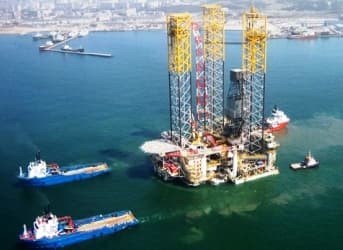There may be as much as 48 billion barrels of oil and 292 trillion cubic feet of natural gas in the Caspian region. There's probably even more yet to be discovered. In June, a BP-led consortium operating in the Shah Deniz natural gas field in the Caspian Sea chose a pipeline option that could redraw the European energy map. On Wednesday, operators at one of the largest oil fields in the world, Kashagan, announced the first well was opened for production. With Russian energy shifting its focus elsewhere, the Caspian region may be fast becoming Europe's preferred choice for oil and gas.
The North Caspian Operating Co. announced Wednesday it produced the first barrels of oil from the Kashagan oil field in the Kazakh waters of the Caspian Sea. NCOC said Kashagan, discovered in 2000, is likely the largest field of its kind with an estimated 35 billion barrels of oil in place. Italian energy company Eni, in charge of the start of production, said initial Kashagan operations would give up around 180,000 barrels of oil per day and eventually ramp up from there.
Related article: Australia NSW to Become Natgas Boom Region?
British Prime Minister David Cameron visited the region in June to discuss the field's development with Kazakh President Nursultan Nazarbayev. He said he was brushing aside human rights concerns in favor of the interests of British companies eyeing reserves in the Caspian Sea. More than a dozen people were killed during energy sector strikes in the Kazakh oil town of Zhanoazen in 2011. Cameron, however, said the "global race for jobs and investment" was his primary concern. Most of the trade relationship between Kazakhstan and the EU focuses on oil and gas. NCOC, for its part, said its export options for Kashagan target European and Chinese markets.
Eurostat, the statistical agency for the EU, said second quarter gross domestic product grew by 0.4 percent for the 27-member EU. OPEC, in its monthly market report for September, said the European economy was returning to growth after 18 months of recession. European economic recovery, the cartel said, was "stronger than expected" and oil demand gains from members of the Organization for Economic Cooperation and Development was "particularly notable" in the Americas and Europe. The energy appetite from an emerging Europe should only continue to grow.
In terms of natural gas, EU members saw their options expand exponentially when a BP-led consortium operating in the Shah Deniz gas field in the Caspian Sea made a decision on its export route for Europe. Discovered more than a decade ago, Shah Deniz should peak at 565 billion cubic feet of natural gas, making it one of the largest natural gas fields in the world. Production is expected to enter into full swing in 2017 and European markets should start getting gas through the Trans-Adriatic Pipeline by 2019.
Related article: How I Learned to Stop Worrying and Love Fracking
BP's selection of TAP ended a pipeline war more than 10 years in the running. Kashagan's launch, meanwhile, is being met with criticism over Kazakhstan's human rights problems and the poor return on investments for what's characterized as one of the most delayed, complex and expensive oil projects in the world. Russian energy company Gazprom in July said its gas exports to the EU increased by 29 percent year-on-year. Norway, however, knocked Russia out of the No. 1 spot in terms of gas supplies to Europe. In 2009, 80 percent of Russia's oil exports went to the EU. With demand centers shifting to Asia, however, Russia has started to shift its oil export focus to China.
While the realignment of the energy map could bring short-term birth pangs to the European economy, by the time the eurozone is in full swing, producers from the Caspian Sea may have taken Russia's place is the exporter of choice.
ADVERTISEMENT
By. Daniel J. Graeber of Oilprice.com


















